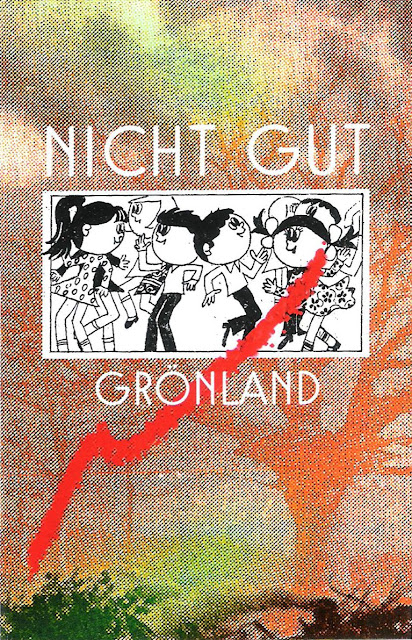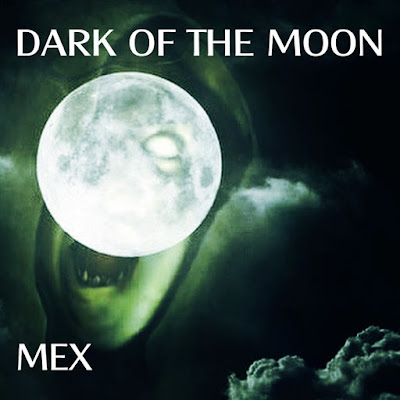'If there was a movie about them,' observed my friend Nick, 'they'd be running round the corner to escape the police in Basildon, and then be in a massive stadium with heroin addictions in the next frame.'
Surprisingly, there is a movie about them, and although Nick was off the mark where the plot is concerned, I nevertheless feel his comment expresses some deeper truth fairly well.
I recall Depeche Mode from way back, at least since they first started turning up in the pages of Sounds.
Ollie who worked in Discovery Records in Stratford referred to them as Depeche Toad, which was amusing; and Photographic on the Some Bizarre Album seemed like a fairly decent impersonation of Cabaret Voltaire, albeit without any of the funny noises which made Cabaret Voltaire interesting; and yet somehow there was a pervasive wholesome quality about them, something guileless, something a bit youth club with synths set up on the ping-pong table. This quality, whatever it was, lingered, rendering subsequent transgressions inherently comical, deeds effortfully undertaken as part of a futile effort to shake off the image, like kids with their first ciggies, lighting the wrong end and taking theatrical drags as though cameras might be running; and then there was the time they found those special sex clothes in that box at the back of dad's wardrobe, and then with the tatts and the arm candy...
I'm sure it was all real, but nevertheless, that's how it looked to me, and how it still looks despite everything. Even a few legitimately great songs - Two Minute Warning, Never Let Me Down Again, Enjoy the Silence, and probably a couple of others - can't quite shift the stench of pop, crisps, and jumpers knitted by your nan, which I propose even whilst holding that Dave Gahan is blessed with a genuinely powerful voice. I'm not even sure what it is - the ballsachingly appalling lyrics, Martin Gore's hair - which doubtless ensured that his dinner money never once saw the inside of the school canteen cash register, the plinky-plonky quality of certain songs, or something else, some emergent property resulting from a combination of indelibly wholesome factors.
Still, it was a free ticket for a film showing for one night only, so I wasn't going to say no, despite my reservations. I anticipated a documentary accounting for their transformation from Herman's Hermits into SPK and then ultimately into U2, but thankfully it was better than that. Spirits in the Forest has six Depeche Mode fans from across the globe tell their stories, interspersed with footage of a predictably massive concert in Berlin. It works because the fans, or at least these fans, are more interesting than the band, so they may as well be Lieutenant Pigeon obsessives for all the difference it makes; and I particularly enjoyed the story of DMK, a tribute act featuring a father and his two kids playing Depeche Mode covers on toy instruments. Actually, I think I liked them more than I liked the main feature.
The live footage, which punctuates the progress of our six fans as we follow them to the gig, fails to shed any light on the mystery of Depeche Mode, at least for me. What subtle qualities their less comical songs may have is lost once blasted out on a scale more suited to some Laibach parody, and Martin Gore standing around like a lemon with a guitar fails to make much difference to anything, and then we come to Dave Gahan, now a troubling hybrid of David Niven and John Waters whose face is too big for his head. His arms and legs are similarly too long for his body, which his weird Jagger impersonations only accentuate meaning that he now vaguely resembles one of those things from Ice Age. I don't understand why you would go to see this band, or why you would go to see them in a stadium the size of the Grand Canyon; but then I found it nevertheless watchable with a couple of decent tunes, despite it being Depeche Mode, so if that's your bag, I've no doubt that Spirits in the Forest must seem amazing.
I'm sure it was all real, but nevertheless, that's how it looked to me, and how it still looks despite everything. Even a few legitimately great songs - Two Minute Warning, Never Let Me Down Again, Enjoy the Silence, and probably a couple of others - can't quite shift the stench of pop, crisps, and jumpers knitted by your nan, which I propose even whilst holding that Dave Gahan is blessed with a genuinely powerful voice. I'm not even sure what it is - the ballsachingly appalling lyrics, Martin Gore's hair - which doubtless ensured that his dinner money never once saw the inside of the school canteen cash register, the plinky-plonky quality of certain songs, or something else, some emergent property resulting from a combination of indelibly wholesome factors.
Still, it was a free ticket for a film showing for one night only, so I wasn't going to say no, despite my reservations. I anticipated a documentary accounting for their transformation from Herman's Hermits into SPK and then ultimately into U2, but thankfully it was better than that. Spirits in the Forest has six Depeche Mode fans from across the globe tell their stories, interspersed with footage of a predictably massive concert in Berlin. It works because the fans, or at least these fans, are more interesting than the band, so they may as well be Lieutenant Pigeon obsessives for all the difference it makes; and I particularly enjoyed the story of DMK, a tribute act featuring a father and his two kids playing Depeche Mode covers on toy instruments. Actually, I think I liked them more than I liked the main feature.
The live footage, which punctuates the progress of our six fans as we follow them to the gig, fails to shed any light on the mystery of Depeche Mode, at least for me. What subtle qualities their less comical songs may have is lost once blasted out on a scale more suited to some Laibach parody, and Martin Gore standing around like a lemon with a guitar fails to make much difference to anything, and then we come to Dave Gahan, now a troubling hybrid of David Niven and John Waters whose face is too big for his head. His arms and legs are similarly too long for his body, which his weird Jagger impersonations only accentuate meaning that he now vaguely resembles one of those things from Ice Age. I don't understand why you would go to see this band, or why you would go to see them in a stadium the size of the Grand Canyon; but then I found it nevertheless watchable with a couple of decent tunes, despite it being Depeche Mode, so if that's your bag, I've no doubt that Spirits in the Forest must seem amazing.
























